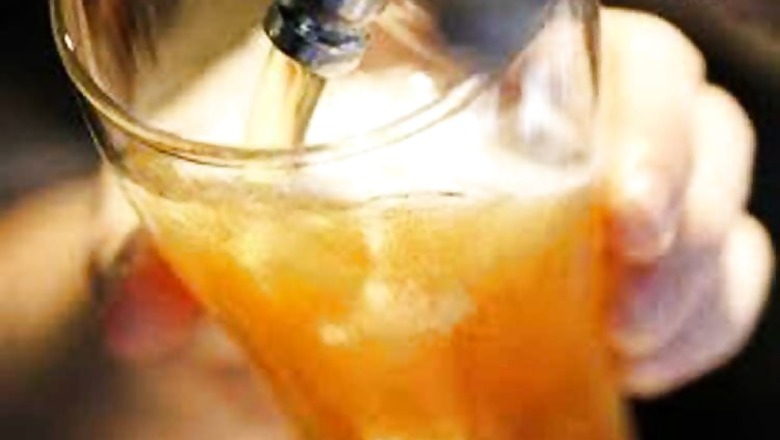
views
New Delhi: Bihar Chief Minister Nitish Kumar is a harsh critic of Prime Minister Narendra Modi's Gujarat model. Ridiculing Modi, he had repeatedly said that the so-called Gujarat model would not work in Bihar. However he has followed the Gujarat model at least in banning the sale of alcohol in Bihar from April 1, next year. It is another matter that prohibition in Gujarat is not Narendra Modi's idea. Gujarat has always been a 'dry' state.
The complete prohibition is a very sensitive and complex issue. It never succeeded anywhere in the world. Even a liberal country like America had imposed ban on alcohol sale in the early 20th century. After it led to the rise of mafia and bootlegging across America, the US government was forced to reverse the ban.
Total ban on alcohol was Nitish Kumar's election promise. Most of his voters are also women and it was their demand. By fulfilling the poll promise, Nitish Kumar is unintentionally forcing the major election bound state Tamil Nadu to follow his model. The demand for complete ban on sale of alcohol is growing across Tamil Nadu. It has even led to violent protests and deaths in the state in the last one year. But, the previous bans did not work in Tamil Nadu.
According to a blog writer, Robert Barker, Tamil Nadu has had a long tradition of dabbling with prohibition since its erstwhile Madras state days. C Rajagopalachari, then chief minister of Madras state, introduced prohibition in his very first tenure. This lasted until the early 60s under Congress governments, led by K Kamaraj. The abolition of prohibition essentially began after the ascent of M Karunanidhi to the Chief Minister's chair. Claiming that illicit liquor was harming the state and bootlegging had become a major problem, the then CM abolished prohibition. Anecdotal evidence suggests that Rajaji begged Karunanidhi to rethink his decision, which he refused to accept at that time. The DMK, however, reversed their decision a few years later, reinstating prohibition which was once again repealed when AIADMK's magnetic leader MGR became the CM for the first time. Since then, Tamil Nadu hasn't seen a return to total prohibition, albeit the degree of state control has varied over the years, and currently one could argue that it is among the least tippler-friendly, prohibition-free states in the Union.
The current Chief Minister, J Jayalalithaa, is struggling to strike a balance between demand for total prohibition and economic realities of the state. The opposition PMK, led by Dr Ramadoss, has made prohibition its main poll promise. It is alleging that Jayalalithaa is protecting the liquor lobby by not agreeing to ban the sale of alcohol. According to a report in 'The Hindu', with revenue from liquor amounting to over 20 per cent of the State's Own Tax Revenue, the government will not be in a position to implement total prohibition even if DMK returns to power in 2016.
"How can you get away with a loss of Rs. 22,000 crore every year? In five years, the revenue loss to the State will be over Rs 1 lakh crore which can't be substituted at all," says an official in the Finance Department.
Past experiences also prove that prohibition won't work in Tamil Nadu.
The situation is no different in neighbouring Kerala. Kerala, once known as 'tipplers' state' or 'drinkers' destination', is also facing opposition to sale of alcohol. Religious institutions like church and some Hindu temples are opposing the sale of liquor. The Oommen Chandy-led UDF government has introduced stringent laws to regulate the sale of liquor. No new licenses are being issued to liquor vendors. Like Tamil Nadu, Kerala is also going to polls next year.
In Karnataka, the JDS-BJP led government between 2006-2007 banned government arrack claiming that the poor people suffer because of it. After the ban in 2007, there have been several incidents of hooch tragedies in the state. Lot of liquor companies are manufacturing cheap Whiskey and Brandy for these poor drinkers who no longer get arrack. The Chief Minister Siddaramaiah's idea of introducing cheap liquor for these people has been met with a lot of resistance. Privately Siddaramaiah admits that alcohol ban won't work.
In Andhra Pradesh, YSR Congress chief YS Jaganmohan Reddy had promised alcohol ban during the 2014 Assembly polls. Since his party lost the polls, he has not been able to impose the ban.
The prohibition has been in force in Gujarat for over 50 years. It does not mean that Gujarat is really a 'dry' state. The liquor shops on Gujarat border have been doing a great business for a long time. The black marketing of liquor is also rampant in the state.
All independent studies have proved that liquor ban or prohibition is not economically feasible anywhere in the World. It has always encouraged bootlegging and manufacture of illicit liquor, which is extremely harmful. Liquor is also a major source of income for many states. Liquor ban also affects the booming tourism industry across India.
Will the total ban on alcohol work in Bihar? Only time will tell.


















Comments
0 comment